Charles E W Bean, Diaries, AWM38 3DRL 606/82/1 - July 1917 - Part 4
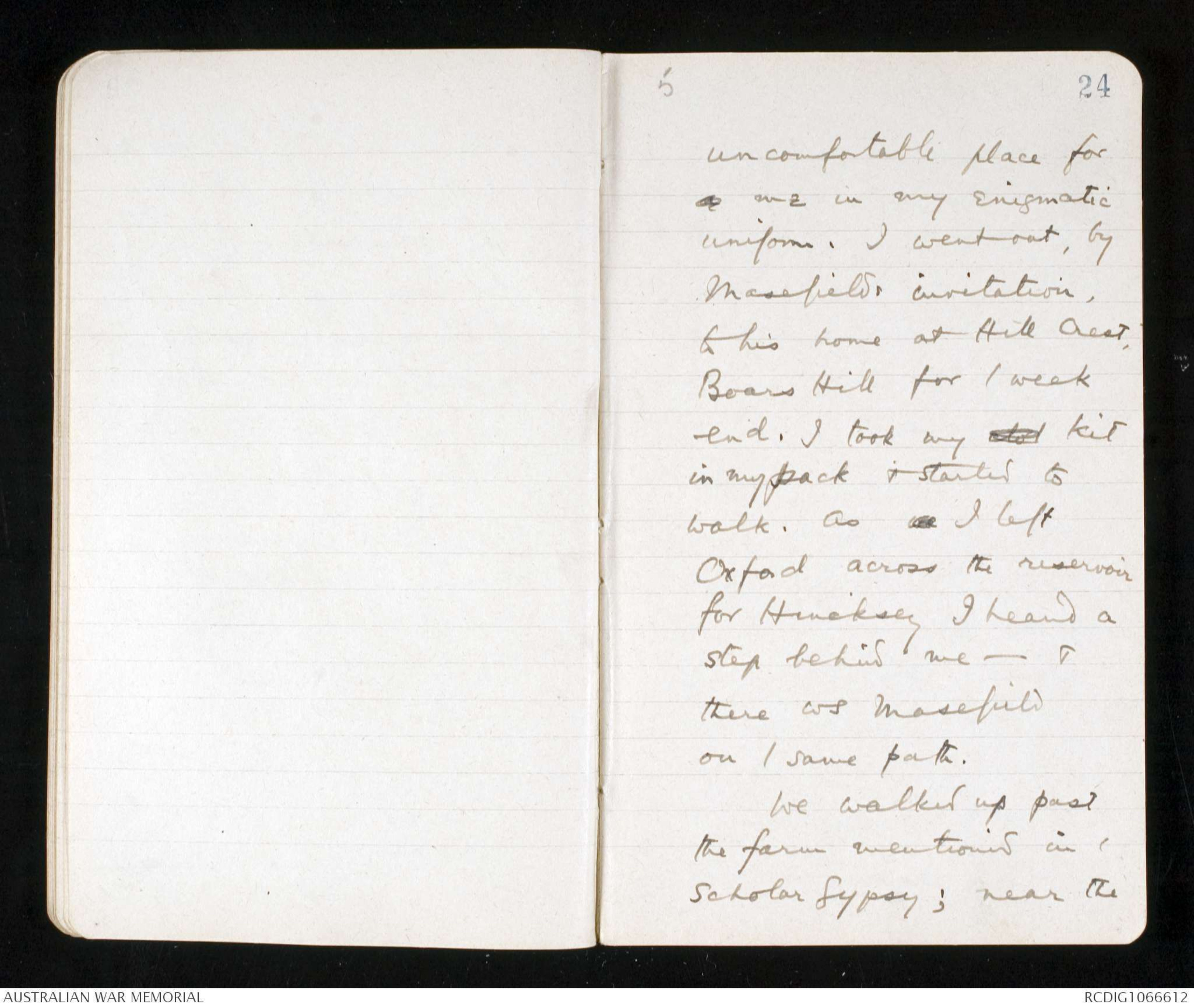
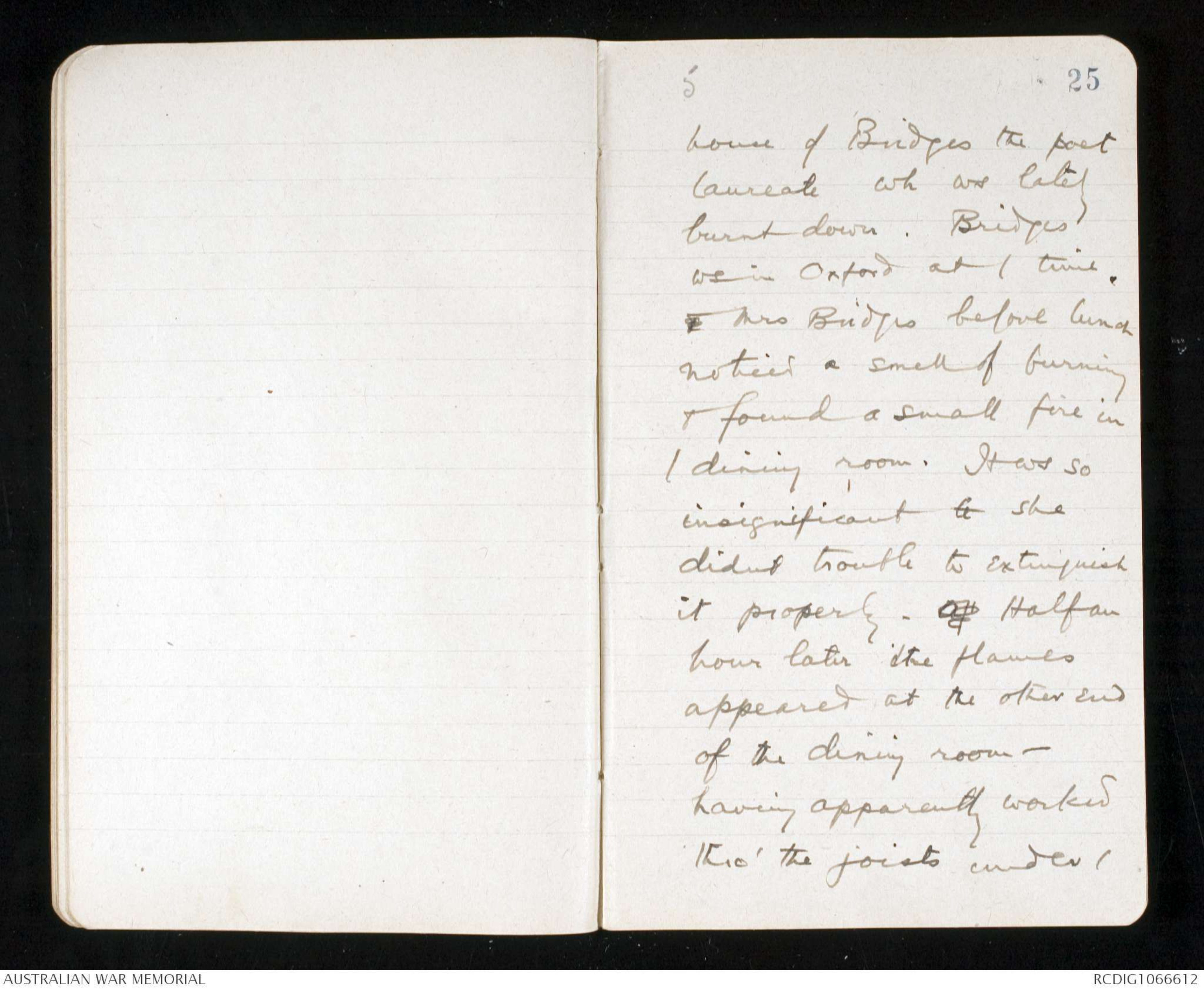
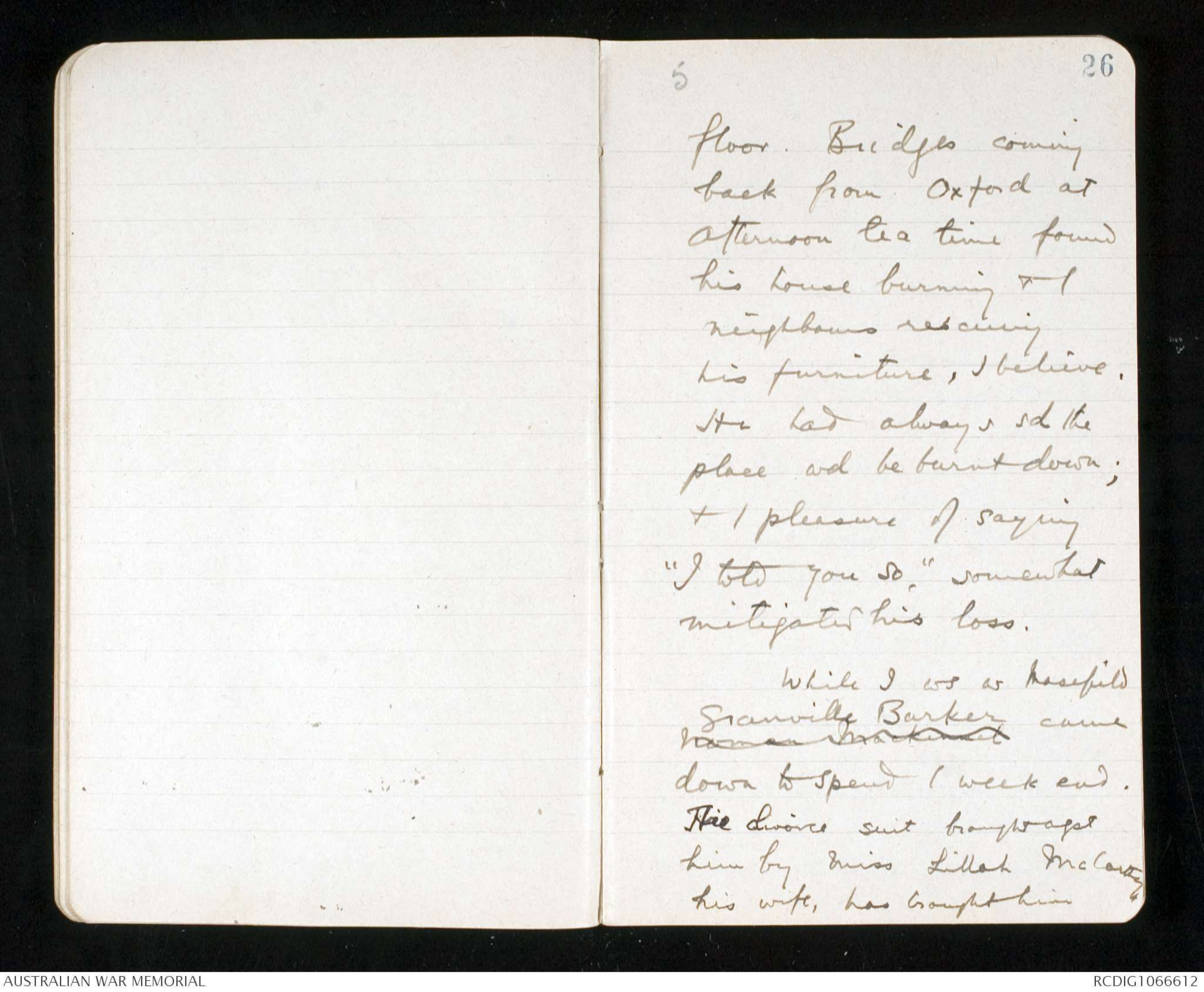
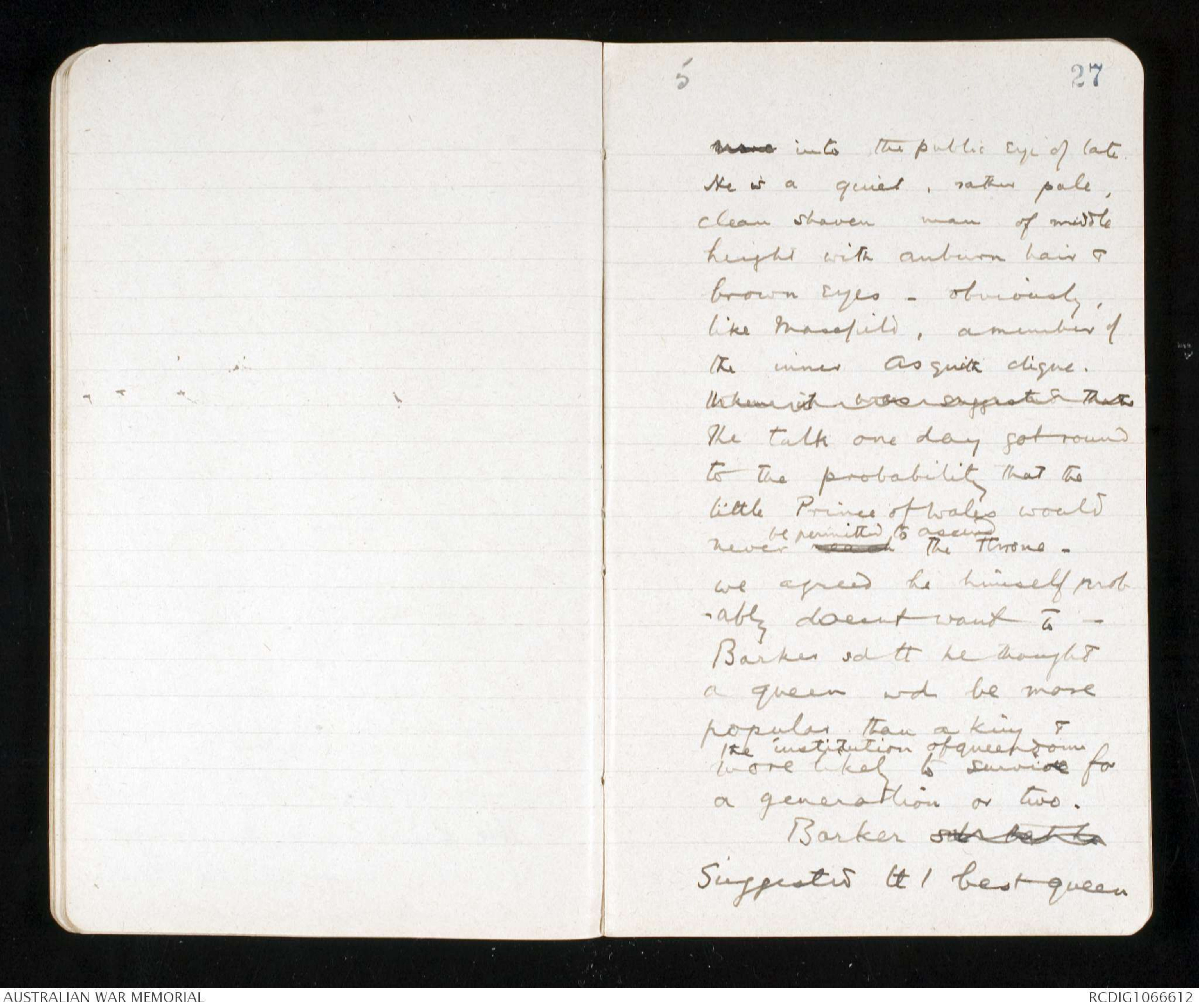
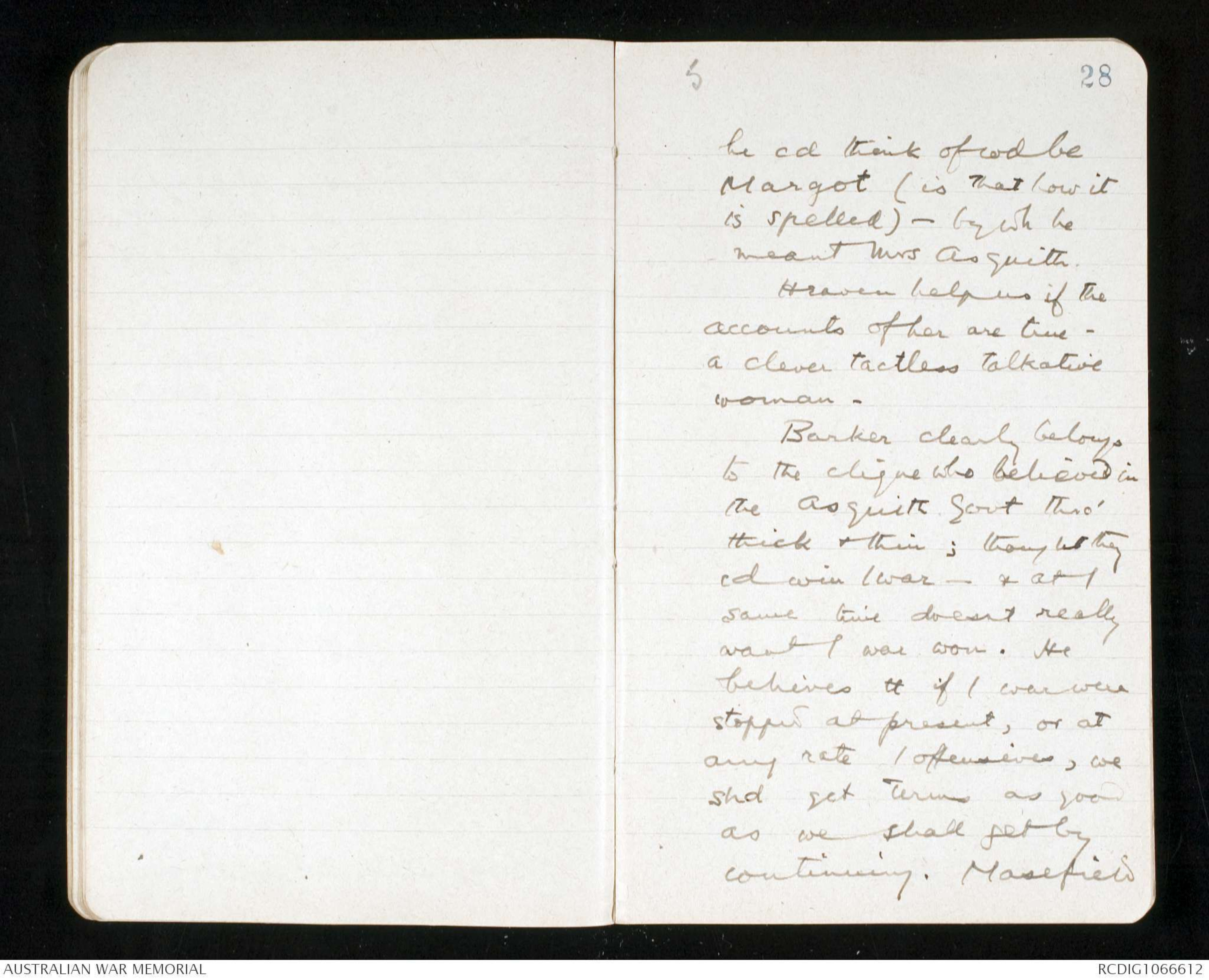
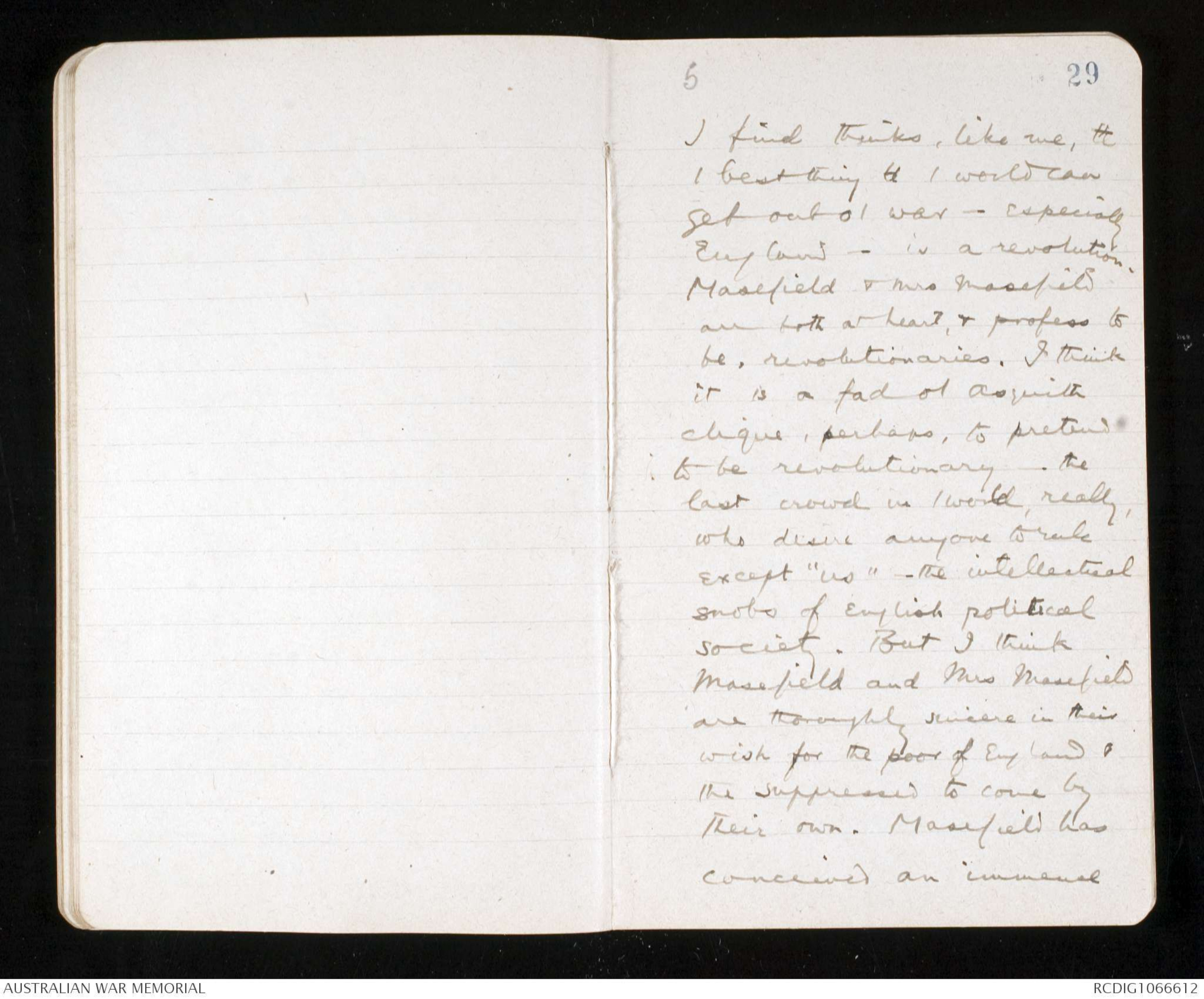
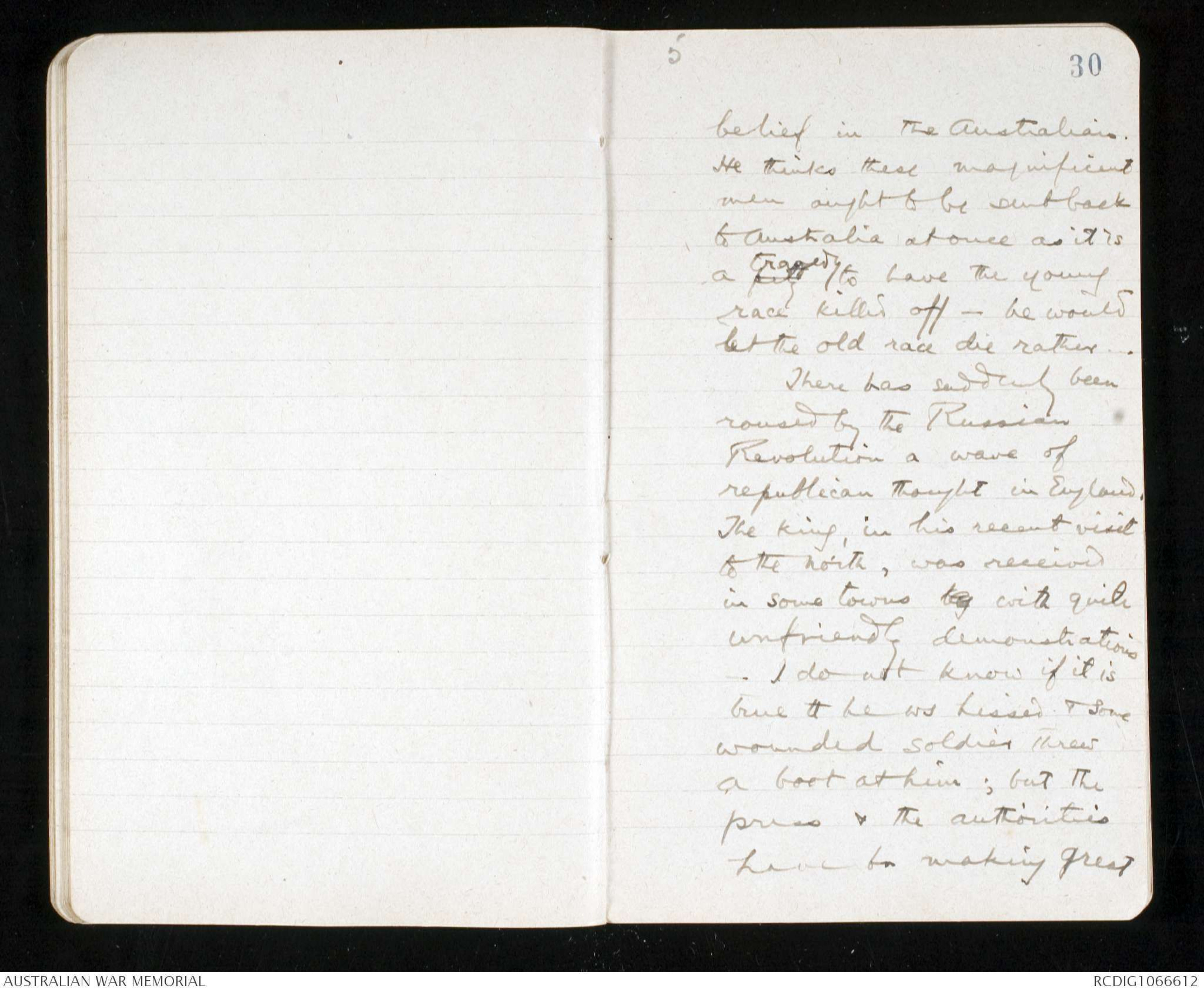
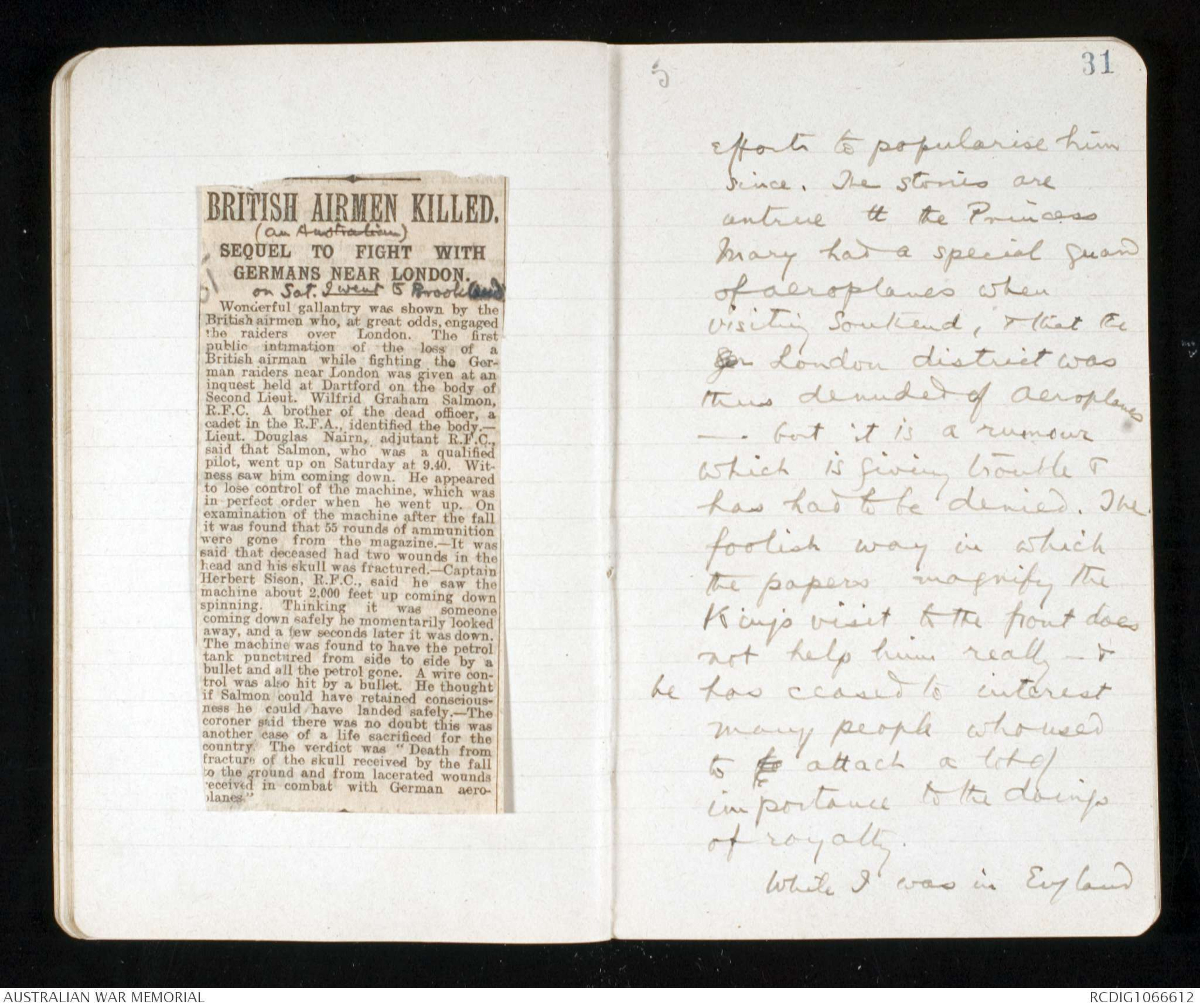
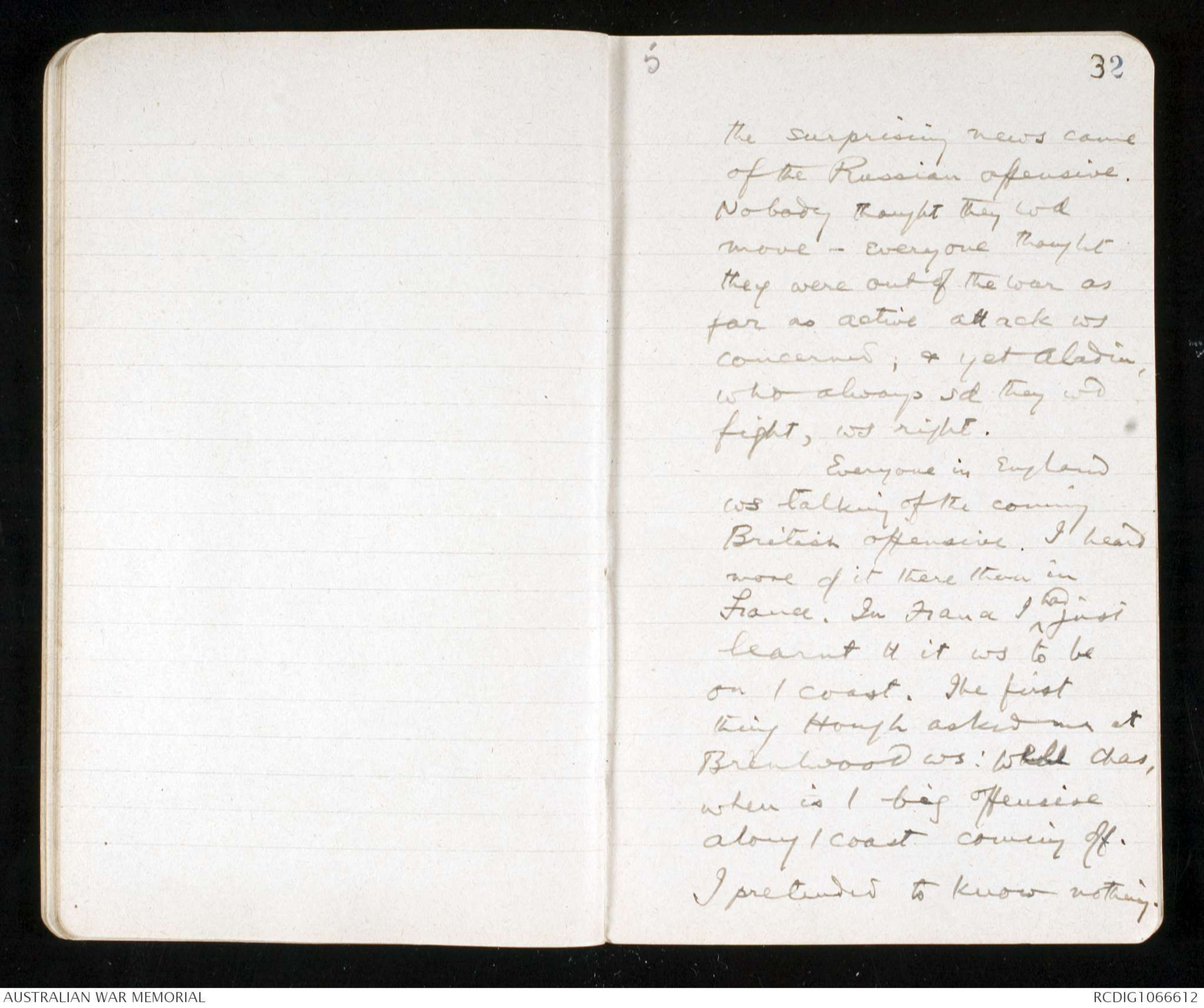
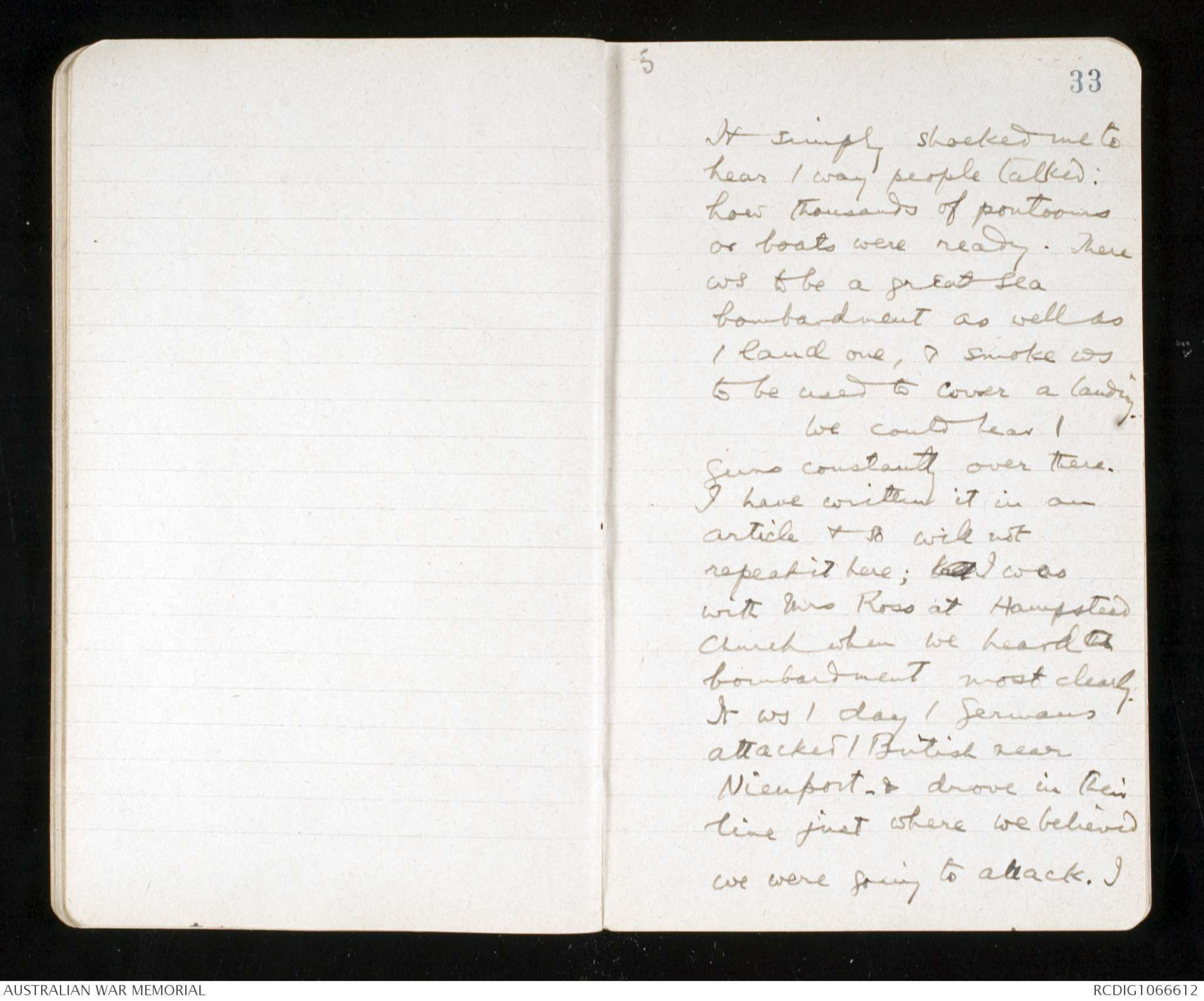
5 24
uncomfortable place forxx me in my enigmatic
uniform. I went out, by
Masefields invitation,
to his home at Hill Crest,
Boars Hill for / week
end. I took my alot kit
in my pack & started to
walk. As we I left
Oxford across the reservoir
for 'Hincksey'I heard a
step behind me - &
there ws Masefield
on / same path.
We walked up past
the farm mentioned in /
Scholar Gypsy; near the
5 25
house of Bridges the poet
laureate wh ws lately
burnt down. Bridges
ws in Oxford at / time.xx Mrs Bridges before lunch
noticed a smell of burning
& found a small fire in
/ dining room. It ws so
insignificant tt she
didnt trouble to extinguish
it properly. Aft Half an
hour later the flames
appeared at the other end
of the dining room -
having apparently worked
thro' the joists under /
5 26
floor. Bridges coming
back from Oxford at
afternoon tea time found
his house burning & /
neighbours rescuing
his furniture, I believe.
He had always sd the
place wd be burnt down;
& / pleasure of saying
"I told you so," somewhat
mitigated his loss.
While I ws w MasefieldNorman Mackinnel Granville Barker came
down to spend / weekend.
The divorce suit brought agst
him by Miss Lillah McCarthy
his wife, has brought him
5 27name into the public eye of late.
He is a quiet, rather pale,
clean shaven man of middle
height with auburn hair &
brown eyes - obviously,
like Masefield, a member of
the inner Asquith clique.xxxxit was suggested that the
The talk one day got round
to the probability that the
little Prince of Wales would
never reach be permitted to ascend the throne -
we agreed he himself probably
doesnt want to -
Barker sd tt he thought
a queen wd be more
popular than a king &
the institution of queendom
more likely to survive for
a generation or two.
Barker subs that he
suggested tt / best queen
5 28
he cd think of wd be
Margot (is that how it
is spelled) - by wh he
meant Mrs Asquith.
Heaven help us if the
accounts of her are true -
a clever tactless talkative
woman.
Barker clearly belongs
to the clique who believed in
the Asquith Govt thro'
thick & thin; thought they
cd win / war - & at /
same time doesnt really
want / war won. He
believes tt if / war were
stopped at present, or at
any rate / offensives, we
shd get terms as good
as we shall get by
continuing. Masefield
5 29
I find thinks, like me, tt
/ best thing tt / world can
get out o / war - especially
England - is a revolution.
Masefield & Mrs Masefield
are both at heart, & profess to
be, revolutionaries. I think
it is a fad o / Asquith
clique, perhaps, to pretend
to be revolutionary - the
last crowd in / world, really,
who desire anyone to rule
except "us" - the intellectual
snobs of English political
society. But I think
Masefield and Mrs Masefield
are thoroughly sincere in their
wish for the poor of England &
the suppressed to come by
their own. Masefield has
conceived an immense
5 30
belief in the Australians.
He thinks these magnificent
men ought to be sent back
to Australia at once as it is
a pity tragedy to have the young
race killed off - he would
let the old race die rather.
There has suddenly been
roused by the Russian
Revolution a wave of
republican thought in England.
The king, in his recent visit
to the north, was received
in some towns by with quite
unfriendly demonstrations
- I do not know if it is
true tt he ws hissed & some
wounded soldiers threw
a boot at him; but the
press & the authorities
have bn making great
BRITISH AIRMEN KILLED.
(an Australian)
SEQUEL TO FIGHT WITH
GERMANS NEAR LONDON.
on Sat. I went to Brookland
Wonderful gallantry was shown by the
British airmen who, at great odds, engaged
the raiders over London. The first
public intimation of the loss of a
British airman while fighting the German
raiders near London was given at an
inquest held at Dartford on the body of
Second Lieut. Wilfrid Graham Salmon,
R.F.C. A brother of the dead officer, a
cadet in the R.F.A., identified the body .-
Lieut. Douglas Nairn, adjutant R.F.C.,
said that Salmon, who was a qualified
pilot, went up on Saturday at 9.40. Witness
saw him coming down. He appeared
to lose control of the machine, which was
in perfect order when he went up. On
examination of the machine after the fall
it was found that 55 rounds of ammunition
were gone from the magazine. - It was
said that deceased had two wounds in the
head and his skull was fractured.- Captain
Herbert Sison, R.F.C., said he saw the
machine about 2,000 feet up coming down
spinning. Thinking it was someone
coming down safely he momentarily
looked away, and a few seconds later it was down.
The machine was found to have the petrol
tank punctured from side to side by a
bullet and all the petrol gone. A wire control
was also hit by a bullet. He thought
if Salmon could have retained consciousness
he could have landed safely. - The
coroner said there was no doubt this was
another case of a life sacrificed for the
country. The verdict was "Death from
fracture of the skull received by the fall
to the ground and from lacerated wounds
received in combat with German aeroplanes."
5 31
efforts to popularise him
since. The stories are
untrue tt the Princess
Mary had a special guard
of aeroplanes when
visiting Southend, & that theGen London district was
thus denuded of aeroplanes
- but it is a rumour
which is giving trouble &
has had to be denied. The
foolish way in which
the papers magnify the
King's visit to the front does
not help him really - &
he has ceased to interest
many people who used
to fe attach a lot of
importance to the doings
of royalty.
While I was in England
5 32
the surprising news came
of the Russian offensive.
Nobody thought they wd
move - everyone thought
they were out of the war as
far as active attack ws
concerned; & yet Aladin,
who always sd they wd
fight, ws right.
Everyone in England
ws talking of the coming
British offensive. I heard
more of it there than in
France. In France I ^had just
learnt tt it ws to be
on / coast. The first
thing Hough asked me at
Brentwood ws: well Chas,
when is / big offensive
along / coast coming off.
I pretended to know nothing.
5 33
It simply shocked me to
hear / way people talked:
how thousands of pontoons
or boats were ready. There
ws to be a great sea
bombardment as well as
/ land one, & smoke ws
to be used to cover a landing.
We could hear / guns
constantly over there.
I have written it in an
article & so will not
repeat it here; when I was
with Mrs Ross at Hampstead
Church when we heard a
bombardment most clearly.
It was / day / Germans
attacked / British near
Nieuport, & drove in their
line just where we believed
we were going to attack. I
 Deb Parkinson
Deb ParkinsonThis transcription item is now locked to you for editing. To release the lock either Save your changes or Cancel.
This lock will be automatically released after 60 minutes of inactivity.